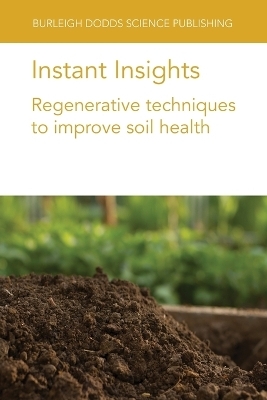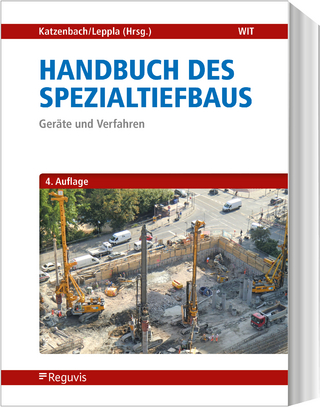
Instant Insights: Regenerative Techniques to Improve Soil Health
Burleigh Dodds Science Publishing Limited (Verlag)
9781801469876 (ISBN)
This book features four peer-reviewed reviews on regenerative techniques to improve soil health.
The first chapter discusses some common issues regarding the use of bio-based fertilisers, such as the concentration of nutrients leading to losses of reactive nitrogen (N) and phosphorus into the environment.
The second chapter provides a critical evaluation of the potential of compost to improve soil health, as well as its effect on soil nutrient cycling, soil hydraulic properties, crop productivity, soil biodiversity and environmental quality. Two case studies on the benefits and risks of using compost in perennial and annual crops are also included.
The third chapter reviews the benefits of service crops, including cover and catch crops, in both intensive cropping systems and low input systems. The chapter discusses an array of studies from temperate Europe to illustrate these benefits, including the use of service crops for reducing N leaching losses.
The final chapter addresses how crop rotations affect nitrogen flows in organic farming systems and how these rotations can be utilised to optimise the nitrogen cycle and improve nitrogen use efficiency. The chapter utilises 30 years’ worth of data collected from over 90 different temperate field studies published between 1990 and 2020.
Chapter 1 - Safe and sustainable use of bio-based fertilizers in agricultural production systems: April Leytem, Robert Dungan, Mindy Spiehs and Dan Miller, United States Department of Agriculture, USA;
1 Introduction
2 Risk factors associated with utilizing bio-based fertilizers in agricultural production
3 Case study: intensive dairy production in the northwest United States
4 Conclusion
5 Future trends in research
6 References
Chapter taken from: Chapter taken from: Amon, B. (ed.), Developing circular agricultural production systems, Burleigh Dodds Science Publishing, Cambridge, UK, 2024, (ISBN: 978 1 80146 256 3)
Chapter 2 - Assessing the effects of compost on soil health: Cristina Lazcano, University of California-Davis, USA; Charlotte Decock, California Polytechnic State University, USA; Connie T. F. Wong, University of California-Davis, USA; and Kamille Garcia-Brucher, California Polytechnic State University, USA;
Cover
1 Introduction
2 Why compost?
3 Effects of compost on soil nutrient cycling
4 Effects of compost on soil hydraulic properties
5 Effect of compost on crop productivity
6 Effects of compost on soil biodiversity
7 Effects of compost on environmental quality
8 The use of compost to improve soil health in annual crops: a case study with strawberries
9 The use of compost to improve soil health, sequester carbon and reduce greenhouse gas emissions in perennial crops: a case stu
10 Conclusion
11 Where to look for further information
12 References
Chapter taken from: Horwath, W. R. (ed.), Improving soil health, Burleigh Dodds Science Publishing, Cambridge, UK, 2023, (ISBN: 978 1 78676 670 0)
Chapter 3 - Service crops as a source of nitrogen in temperate Europe: Iris Vogeler, Aarhus University, Denmark and Christian-Albrechts University, Germany; Peter Sørensen and Ingrid K. Thomsen, Aarhus University, Denmark; and Friedhelm Taube, Christian-Albrechts University, Germany;
1 Introduction
2 Service crops in rotation with cash crops
3 Service crops intercropped with cash crops
4 Effects of service crops on yields
5 Residual effects of service crops
6 Nitrate leaching
7 Conclusion
8 Where to look for further information
9 References
Chapter taken from: Ladha, J. K. (ed.), Improving nitrogen use efficiency in crop production, Burleigh Dodds Science Publishing, Cambridge, UK, 2024, (ISBN: 978 1 80146 470 3)
Chapter 4 - The role of crop rotations in optimizing nitrogen use efficiency in organic farming: Lucie Chmelíková and Kurt-Jürgen Hülsbergen, Technical University of Munich, Germany; and Sebastian Wolfrum, Technical University of Munich, Germany, and Bavarian State Research Center for Agriculture, Germany;
1 Introduction
2 Crop rotations and nitrogen flows in organic farming
3 Assessing nitrogen flows and nitrogen use efficiency in organic farming: case study
4 Assessing nitrogen flows and nitrogen use efficiency in organic farming: results
5 Improving the use of rotations to optimize nitrogen flows and nitrogen use efficiency
6 Conclusion
7 Future trends
8 Where to look for further information
9 References
Chapter taken from: Ladha, J. K. (ed.), Improving nitrogen use efficiency in crop production, Burleigh Dodds Science Publishing, Cambridge, UK, 2024, (ISBN: 978 1 80146 470 3)
| Erscheinungsdatum | 23.05.2024 |
|---|---|
| Reihe/Serie | Burleigh Dodds Science: Instant Insights |
| Zusatzinfo | Color tables, photos and figures |
| Verlagsort | Cambridge |
| Sprache | englisch |
| Maße | 152 x 229 mm |
| Gewicht | 214 g |
| Themenwelt | Naturwissenschaften ► Geowissenschaften ► Geologie |
| Technik ► Elektrotechnik / Energietechnik | |
| Weitere Fachgebiete ► Land- / Forstwirtschaft / Fischerei | |
| ISBN-13 | 9781801469876 / 9781801469876 |
| Zustand | Neuware |
| Informationen gemäß Produktsicherheitsverordnung (GPSR) | |
| Haben Sie eine Frage zum Produkt? |
aus dem Bereich


